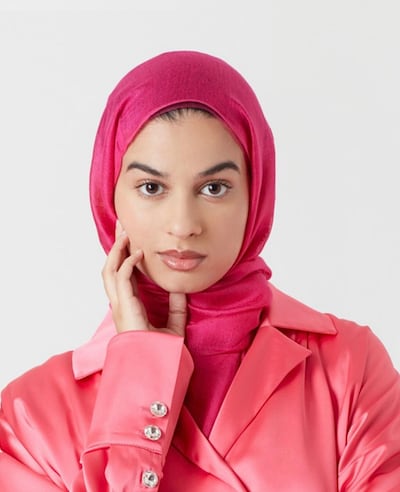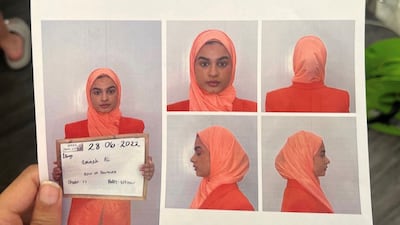When Aminah Ali was a young girl, she enjoyed playing with dolls, styling their hair and dressing them up in different outfits, even though she rarely saw dolls that represented her British-Pakistani heritage.
Fast-forward almost two decades, and Ali features in Barbie, the highest-grossing film by a female director, releasing in UAE cinemas on Thursday.
Ali, 24, was scouted through Bame, a London modelling agency with a focus on Asian and black models. She features in a brief sequence with numerous other women, in a scene called “Row of Barbies”.
model
The shot was filmed in June last year and Ali had to keep her appearance a secret after signing a non-disclosure agreement, but now she’s finally allowed to talk about her experience.
“Initially, I was uncertain about how I would fit into the movie because I never saw a Barbie that resembled me while growing up,” Ali tells The National. “However, as I arrived on set and witnessed the diverse range of girls, it made me feel at ease and helped me better understand my place in the production.”
Ali has a call time of 5am and was on set for about 15 hours. The outfit selected for her to wear is a striking, coral-toned suit set with a peach hijab.
“I thought I would have to wear pink, and I wasn't sure how it would look, but they chose an outfit that represented me,” says Ali.
If Ali had been given the opportunity to style herself, she says her look would have been equally impactful. After all, she’s no newbie to the world of fashion, having studied at London College of Fashion and Central Saint Martins.
As a digital content creator, she has worked with various fashion labels including adidas – starring on posters and billboards for the brand across London – and has also modelled for Asos. Ali currently works as a creator partnerships manager at TikTok, and is the founder of Redefining Concepts, a platform she launched in 2017 to bring together diverse London creatives.
Unity in diversity
In the 64 years since the doll was launched, Barbie has come under fire for a lack of diversity and propagation of narrow beauty standards. However, in recent years, toymaker Mattel has taken steps to focus on inclusivity when creating new Barbie versions – Muslims included.
In 2017, the company released a hijab-wearing Barbie doll in the image of American-Muslim Olympic fencer Ibtihaj Muhammad. New Barbie offerings feature various body shapes, sizes and colours, and last year Mattel expanded its range to include more dolls with disabilities, including a Barbie with a behind-the-ear hearing aid and one with a prosthetic leg.

Ali says that this spirit of inclusivity is evident in the new film.
“Barbie beautifully celebrates diversity by portraying there isn't a single standard for how the doll should look. The movie reflects the idea that there is a Barbie for every girl, regardless of her background, appearance or characteristics,” she says. “Young viewers can now see themselves represented and this will empower them to embrace their uniqueness.
“There's often a stigma surrounding how people perceive young Muslims and their representation,” adds Ali. “I believe it's crucial to break these stereotypes.”
Ali is one of three Muslim women who make short appearances in Barbie. The other two are life coach and social media personality Fatumina Said Akbar and model Khadeejah Khan, both of whom are also represented by Bame. Employing the trio, along with the host of other women enlisted, is a powerful statement in a film that, according to director Greta Gerwig, celebrates feminism.
Perhaps this is why countless women across the globe have been attracted to the Barbiecore aesthetic, dressing up in themed outfits and accessories.
Muslim women and those who embrace modestwear are no exception – many have taken to social media to showcase their Barbie-inspired looks. London boutique The Cave, for instance, got an order for 40 pink veils for a group of women who were planning to watch the film together.
Some critics have admonished the global hype surrounding the film, arguing that Barbie does not promote “Islamic values” and instead endorses “white feminism”. However, British-Pakistani journalist Shaheena Uddin argues that the film is in fact a celebration of intersectional feminism, thanks to the inclusion of America Ferrera’s character Gloria, who is Latin and educates Barbie about being a “white saviour”.
The white saviour narrative is one that often accompanies Muslim characters in the mainstream media, and Uddin writes that the inclusion of not only one, but three Muslim women in the film is “heartwarming” – though she wishes they had speaking roles, too.
Ali says that her experience being a part of Barbie was “rewarding and inclusive”.
“I hope it continues to pave the way for more representation and the understanding of different cultures and backgrounds,” she says. “It's essential to show we can achieve great things while staying true to our identity.”








